| Gonocarpus teucrioides | |
|---|---|
 | |
| Scientific classification | |
| Kingdom: | Plantae |
| Clade: | Tracheophytes |
| Clade: | Angiosperms |
| Clade: | Eudicots |
| Order: | Saxifragales |
| Family: | Haloragaceae |
| Genus: | Gonocarpus |
| Species: | G. teucrioides |
| Binomial name | |
| Gonocarpus teucrioides | |
| Synonyms[3] | |
|
Haloragis aenea Schindl. | |
Gonocarpus teucrioides, or forest raspwort[4] is a common flowering herb or subshrub in the Haloragaceae, or watermilfoil family. It is native to Queensland, New South Wales, Victoria and Tasmania[5] and is widespread and abundant in the understorey of wet forests.[6] The name raspwort refers to the rough, scabrous surface of many of the Gonocarpus species.[7]
The specific epithet, teucrioides, derives from Teucrium and the Greek suffix -oides which indicates resemblance, thereby giving an adjective meaning that the species resembles the plants in the genus, Teucrium.[8]
Habit


It is an erect perennial herb, woody at the base, 30–40 cm tall and 20–30 cm wide.[9] Its stems are 4-angled in cross section. Leaves are opposite and ovate, with toothed margins and 7–22 mm long. They have a dark green upper surface and a lighter undersurface, stems are often reddish.[9] Both the leaves and stems have stiff, spreading hairs.[6] Flowers are small and solitary, occurring in pairs of bracts in the leaf axils along the lower section of the flowering stem.[10] They are carried in racemes at the end of the stem.[11] Bracts are green and fleshy, petals are green to reddish. Plants are monoecious,[11] and flowering occurs from October to January.[12] Fruit is an ovoid, silver-grey ribbed nut, about 1.5 mm long.[13]
Habitat
Native to Queensland, New South Wales, Victoria and Tasmania, Gonocarpus teucrioides prefers moist, well-drained soils in semi-shade.[10] It is thus common in the understorey of open or partially open forests and vegetation types, especially those subjected to enhanced runoff or higher rainfall.[14]
References
- ↑ "Gonocarpus teucrioides". Australian Plant Name Index, IBIS database. Centre for Plant Biodiversity Research, Australian Government.
- ↑ Candolle, A.P. de in Candolle, A.P. de (ed.) (1828), Halorageae. Prodromus Systematis Naturalis Regni Vegetabilis 3: 66
- ↑ "Gonocarpus teucrioides DC. | Plants of the World Online | Kew Science". Plants of the World Online. Retrieved 13 November 2019.
- ↑ "Family Index". www.understorey-network.org.au. Retrieved 5 December 2019.
- ↑ Peter G. Wilson. "Gonocarpus teucrioides". PlantNET – New South Wales Flora Online. Royal Botanic Gardens & Domain Trust, Sydney Australia. Retrieved 14 November 2019.
- 1 2 "Key to Tasmanian Dicots". www.utas.edu.au. Retrieved 5 December 2019.
- ↑ "Key to Tasmanian Dicots". www.utas.edu.au. Retrieved 5 December 2019.
- ↑ "teucrioides". www.plantillustrations.org. Retrieved 13 November 2019.
- 1 2 Howells, Christine (2012). Tasmania's natural flora (Second ed.). Hobart, Tasmania. ISBN 978-0-909830-66-3. OCLC 803605684.
{{cite book}}: CS1 maint: location missing publisher (link) - 1 2 ".: Gonocarpus teucrioides :". fe.yarraranges.vic.gov.au. Retrieved 5 December 2019.
- 1 2 "Gonocarpus teucroides". www.northheadsanctuaryfoundation.org.au. Retrieved 5 December 2019.
- ↑ "Flora of Victoria". vicflora.rbg.vic.gov.au. Retrieved 5 December 2019.
- ↑ "Gonocarpus teucrioides". sutherland.austplants.com.au. Retrieved 5 December 2019.
- ↑ Orchard, A.E. (2004). "Gonocarpus hirtus Orchard (Haloragaceae), new from southeastern Queensland and northeastern New South Wales". Austrobaileya. 6 (4): 961–965. doi:10.5962/p.299706. ISSN 0155-4131. JSTOR 41739073. S2CID 260270249.
External links
- Gonocarpus teucrioides occurrence data from Australasian Virtual Herbarium
 Media related to Gonocarpus teucrioides at Wikimedia Commons
Media related to Gonocarpus teucrioides at Wikimedia Commons